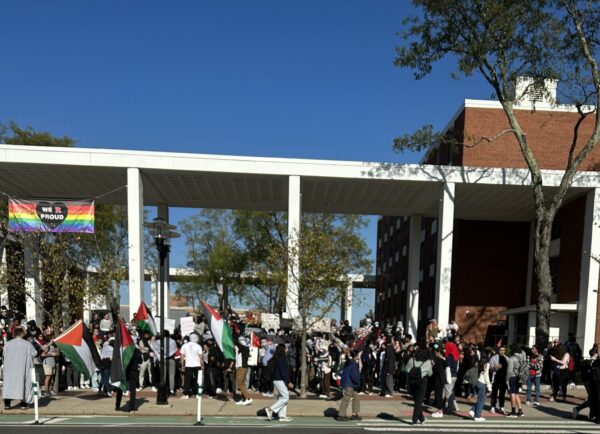
After weeks of disruptive behavior, vile harassment of Jewish students and unacceptable levels of incitement on campus, Rutgers announced the suspension of its Students for Justice in Palestine (SJP) group Tuesday, becoming the second state university in the nation (and the fifth school overall) to temporarily ban SJP.
For those of us who’ve been actively lobbying Rutgers President Jonathan Holloway to take action, the news comes as a significant and important achievement. After weeks of watching Jewish students being physically and verbally harassed, forced to alter their daily routines to avoid angry pro-Palestinian protests, subjected to interruptions of classroom and library study and more, there is a measure of relief that justice and accountability has – at least for the moment – been applied.
When Federation CEO Dov Ben-Shimon announced the news Tuesday night at a JCC MetroWest event with October 7th survivors, hundreds of people rose to their feet in a standing ovation, revealing just how troubling the lack of action has been until now.
To what degree the suspension of SJP will tamp down the worst actions of pro-Palestinian agitators at Rutgers is still unknown. While this decision makes clear that disruptive behavior that interferes with students’ rights to study, learn, and freely associate on campus is a violation of university policy, it doesn’t condemn the acts of shouting genocidal language (“From the river to the sea, Palestine will be free”), teaching about the Israel/Palestinian conflict from a grossly one-sided perspective, or bringing in outside speakers who accuse Israel of blood libel.
One of the worst recent examples of this was a webinar with Columbia University Professor Joseph Masaad entitled “The West, Israel and Settler Colonization of Palestine,” sponsored by Rutgers-Newark Center for Security, Race and Rights (CSRR), a stridently anti-Israel, pro-Palestinian “think tank” led by Rutgers law professor Sahar Aziz.
Among the outrageous and deplorable lies uttered by Masaad to an online audience was the accusation that the atrocities of October 7 never happened, at least not to the extent described by Israel. He also asserted that IDF soldiers were responsible for killing many of their own Israeli civilians. You can view the full program here.
Again, this Center is funded by Rutgers University and operates from their Newark campus.
Over the course of many months, we at Jewish Federation have brought our concerns about the CSRR and general harassment of Jewish students to the attention of Rutgers Newark Chancellor Nancy Cantor. When they weren’t properly addressed, we scheduled a meeting with President Holloway. In August Rutgers announced that Nancy Cantor would be leaving Rutgers Newark in June 2024.
But attempts to shut down hate speech that targets Jews and supporters of Israel, as we learned during the controversial congressional hearings with the presidents of Harvard, Penn, and MIT, are being met with a wall of institutional resistance backed by constitutional protections which invalidate our frustrated and heartfelt pleas for oversight.
Of course, we understand the university’s commitment to academic freedom and the First Amendment principles of free speech and assembly. We know that issues surrounding the Israel/Palestinian conflict, especially as it relates to the current war in Gaza, are complex, nuanced, and fraught. Universities should be places where students wrestle with competing ideas, and students must learn to interact with people with whom they may fiercely disagree.
And yet.
When students cannot function and thrive because they’re unable to express their views without fear of harassment and retribution, the university is failing them. If Jewish students need to take a longer route to the library to avoid being verbally abused by pro-Palestinian activists, their campus is a place of intolerable anti-Jewish hate.
This is why, as parents, donors, alumni, and stakeholders, we must continue to monitor events at Rutgers (and all universities attended by our children) to ensure that Jewish students and professionals are properly supported.
President Holloway only issued his decision to suspend SJP after he received 12,000 emails (what he referred to as online harassment, before apologizing for his poor choice of words). And just as we expressed our anger in great numbers before the decision, I urge everyone to send a follow up email thanking President Holloway at holloway@rutgers.edu.
In a letter we sent to President Holloway, we stated, “We applaud you for being only the second president of a state university to take this action and hope it leads to the lessening of tensions and a climate of respectful civil discourse when students return for second semester.”
Where violations of civil rights occur on campus, students are entitled to Title VI protections afforded by federal law. To ensure that our Jewish students enjoy all the rights and experiences afforded to all college students, it is imperative that we remain vigilant and continue to make our voices heard.

